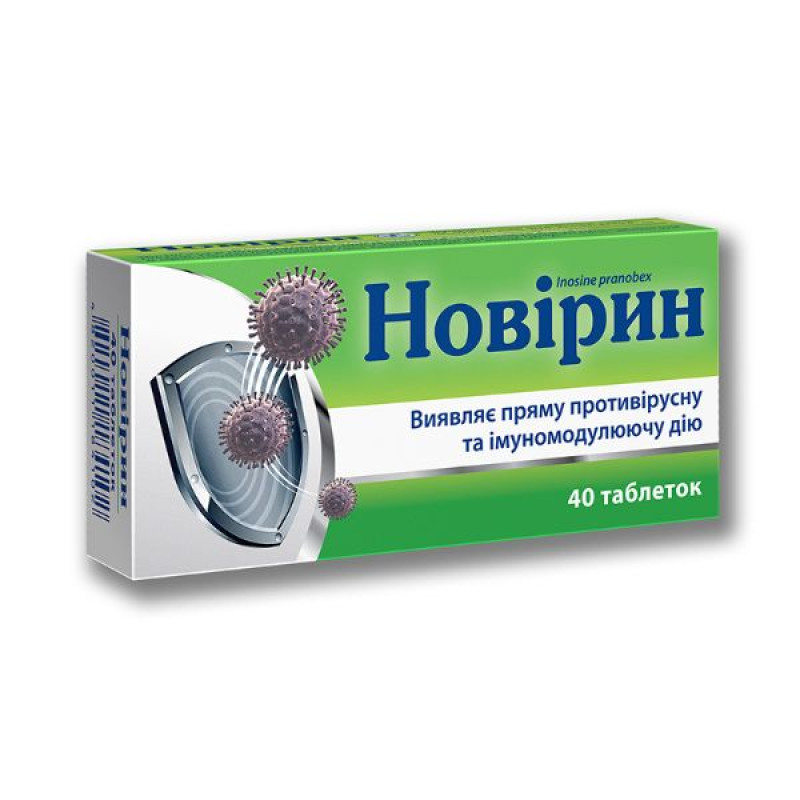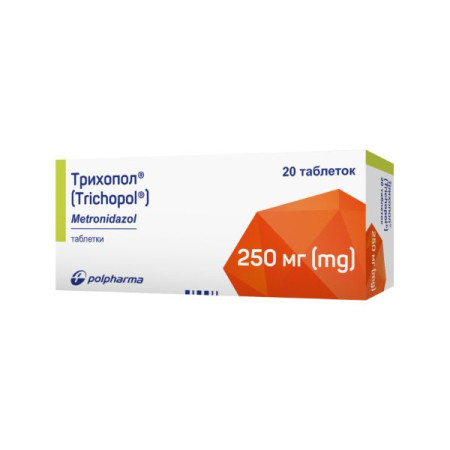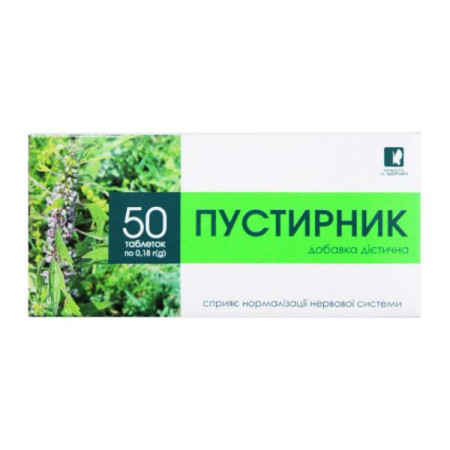Novirin tablets 500 mg blister No. 40

Instructions for use Novirin tablets 500 mg blister No. 40
Composition
active ingredient: inosine pranobex;
1 tablet contains inosine pranobex 500 mg;
Excipients: potato starch, povidone, magnesium stearate.
Dosage form
Pills.
Main physicochemical properties:
500 mg tablets: round tablets with a biconvex surface with a score, from almost white to yellowish-white in color.
Pharmacotherapeutic group
Direct-acting antivirals. ATX code J05A X05.
Pharmacological properties
Pharmacodynamics
The active substance - inosine pranobex (molecular complex inosine: p-acetamidobenzoic acid: N,N-dimethylamino-2-propanol in the ratio 1:3:3) has a direct antiviral and immunomodulatory effect. The direct antiviral effect is due to binding to the ribosomes of virus-infected cells, which slows down the synthesis of viral mRNA (disruption of transcription and translation) and leads to inhibition of the replication of RNA and DNA genomic viruses; the indirect effect is explained by the powerful induction of interferon formation.
The immunomodulatory effect is due to the effect on T-lymphocytes (activation of cytokine synthesis) and increased phagocytic activity of macrophages. Under the influence of the drug, the differentiation of pre-T-lymphocytes is enhanced, the mitogen-induced proliferation of T- and B-lymphocytes is stimulated, the functional activity of T-lymphocytes is increased, including their ability to produce lymphokines, the ratio between T-helper and T-suppressor subpopulations is normalized (the immunoregulatory index CD4/CD8 is restored). The drug significantly enhances the production of interleukin-2 by lymphocytes and promotes the expression of receptors for this interleukin on lymphoid cells; it also stimulates the activity of natural killers (NK cells) even in healthy people; stimulates the activity of macrophages for phagocytosis, processing and presentation of antigen, which contributes to the increase in antibody-producing cells in the body from the first days of treatment.
It also stimulates the synthesis of interleukin-1, microbicidal activity, expression of membrane receptors and the ability to respond to lymphokines and chemotactic factors. In case of herpes infection, the formation of specific anti-herpetic antibodies is significantly accelerated, clinical manifestations and the frequency of relapses are reduced.
The drug also prevents post-viral weakening of cellular RNA and protein synthesis in cells that have been infected, and this is especially important for cells that are involved in the processes of the body's immune defense. As a result of such a complex action, the viral load on the body is reduced, the activity of the immune system is normalized, and the synthesis of its own interferons is significantly activated, which contributes to resistance to infectious diseases and rapid localization of the focus of infection in the event of its occurrence.
Pharmacokinetics
The drug has high bioavailability, is rapidly absorbed after oral administration, the maximum concentration of inosine in blood plasma is reached after 1 hour; the pharmacological effect appears after approximately 30 minutes and lasts up to 6 hours.
Inosine is metabolized according to a cycle typical of purine nucleosides, with the formation of uric acid; other components are excreted by the kidneys in the form of glucuronic and oxidized derivatives, as well as in unchanged form. Cumulation in the body has not been detected. Complete elimination of the drug and its metabolites occurs after 48 hours.
Indication
Infectious diseases of viral etiology in patients with reduced immune status in case of repeated upper respiratory tract infections
Treatment of cold sores on the lips and face caused by the herpes simplex virus (Herpes simplex)
Contraindication
Hypersensitivity to inosine pranobex and to other components of the drug; gout, urolithiasis, severe renal failure III degree, hyperuricemia.
Interaction with other medicinal products and other types of interactions
The drug should not be taken simultaneously with immunosuppressants. Use with caution in patients taking xanthine oxidase inhibitors (e.g. allopurinol) and agents that increase urinary uric acid excretion, including thiazide diuretics (e.g. hydrochlorothiazide, chlorthalidone, indapamide) and loop diuretics (furosemide, torasemide, ethacrynic acid).
When used simultaneously with azidothymidine, nucleotide formation is increased due to increased bioavailability of azidothymidine in blood plasma and increased intracellular phosphorylation in human blood monocytes.
Application features
The active substance of the drug is metabolized to uric acid and can cause a significant increase in its concentration in the urine. In this regard, Novirin should be used with caution in patients with gout and hyperuricemia in history, urolithiasis and renal failure. If necessary, the drug should be used in such patients, it is necessary to carefully monitor the concentration of uric acid. With long-term use (3 months or longer), it is advisable to monitor the concentration of uric acid in the blood serum and urine, liver function, peripheral blood composition and kidney function parameters every month.
Some individuals may experience acute hypersensitivity reactions (angioedema, anaphylactic shock, urticaria). In such cases, drug therapy should be discontinued.
With prolonged use of the drug, there is a risk of developing nephrolithiasis.
Elderly patients. There is no need to change the dose, the drug should be used in the dosage for adults. In elderly people, an increase in the level of uric acid in the blood serum and urine is observed more often than in middle-aged people.
Use during pregnancy or breastfeeding
There are no studies on the condition of the fetus and impaired fertility in humans. It is not known whether inosine pranobex penetrates into breast milk. In the absence of studies on the safety of the drug, it is not recommended to prescribe it during pregnancy or breastfeeding.
Ability to influence reaction speed when driving vehicles or other mechanisms
The effect of the drug on the reaction rate when driving or operating other mechanisms has not been studied. However, when making a decision about driving or operating other mechanisms, it should be taken into account that the drug may cause dizziness or other adverse reactions from the nervous system (see section "Adverse reactions").
Method of administration and doses
The drug should be taken orally, preferably after meals and at regular intervals; if necessary, the tablet can be chewed, crushed and/or dissolved in a small amount of water immediately before use. The duration of treatment is determined by the doctor individually depending on the nosology, severity of the course and frequency of relapses; on average, the duration of treatment is 5–14 days, after the symptoms disappear, it should be taken for another 1-2 days.
Recommended doses and schedules of drug administration
Infectious diseases of viral etiology in patients with reduced immune status in case of repeated upper respiratory tract infections:
Adults – 2 tablets of 500 mg 3–4 times a day; children – daily dose at the rate of 50 mg/kg of body weight in 3–4 doses.
Diseases caused by: herpes simplex viruses Herpes simplex type I or II (herpes of the lips, facial skin, oral mucosa, skin of the hands, ophthalmoherpes):
Adults – 2 tablets of 500 mg 3–4 times a day; children – daily dose at the rate of 50 mg/kg in 3–4 doses.
To achieve the greatest effectiveness of treatment, it is better to start at the first symptoms of the disease or on the first day of the disease.
Elderly patients. The drug can be used in usual doses for adults, there is no need for dose adjustment.
Children
The medicine should be used in children over 1 year of age.
Overdose
No cases of overdose have been observed. Overdose may cause an increase in the concentration of uric acid in the blood serum and urine. In case of overdose, gastric lavage and symptomatic therapy are indicated.
Adverse reactions
The drug is generally well tolerated even with long-term use. The most common adverse reaction is a short-term and slight (usually within normal limits) increase in the concentration of uric acid in the blood serum and urine (caused by the metabolism of inosine), which normalizes a few days after the end of the drug.
Laboratory tests: increased blood uric acid levels, increased urine uric acid levels, increased blood urea nitrogen levels, increased transaminase levels, increased blood alkaline phosphatase levels.
From the nervous system: headache, dizziness, increased fatigue, malaise, sleep disorders.
On the part of the digestive tract: nausea, vomiting, epigastric pain, diarrhea, constipation, lack of appetite.
Skin and subcutaneous tissue disorders: itching, skin rash, urticaria.
Immune system disorders: hypersensitivity reactions (including angioedema).
Mental disorders: nervousness.
Liver and biliary tract disorders: increased levels of transaminases, alkaline phosphatase or blood urea nitrogen.
Musculoskeletal and connective tissue disorders: joint pain.
Kidney and urinary tract disorders: polyuria (increased urine volume).
During post-marketing surveillance, the following adverse reactions were reported, the frequency of which cannot be estimated from the available data:
from the digestive tract: abdominal pain (in the upper abdomen);
from the immune system: anaphylactic reactions, anaphylactic shock, angioedema, hypersensitivity, urticaria;
Skin and subcutaneous tissue disorders: erythema.
Expiration date
3 years.
Storage conditions
Store in the original packaging at a temperature not exceeding 25 ºС.
Keep out of reach of children.
Packaging
10 tablets in a blister; 2 blisters in a pack.
10 tablets in a blister; 4 blisters in a pack.
Vacation category
Without a prescription.
Producer
JSC "KYIV VITAMIN FACTORY".
Location of the manufacturer and address of its place of business
04073, Ukraine, Kyiv, Kopylivska St., 38.
Website: www.vitamin.com.ua
There are no reviews for this product.
There are no reviews for this product, be the first to leave your review.
No questions about this product, be the first and ask your question.













